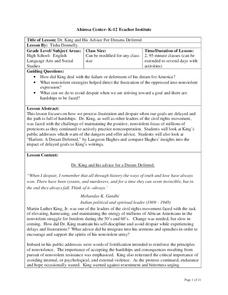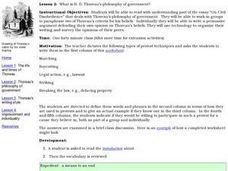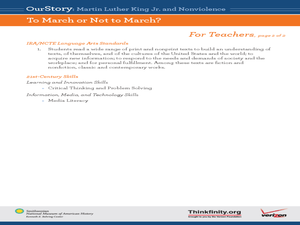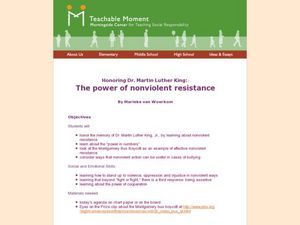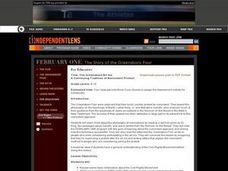Curated OER
Understanding the Theoretical Basis for Civil Disobedience
Young scholars analyze Henry David Thoreau's 'On the Duty of Civil Disobedience' and Dr. Martin Luther King's "Letter from Birmingham Jail." In this civil disobedience lesson, students read Thoreau's essay and answer 6 questions for the...
Curated OER
Nonviolent Protest Around the World
Twelfth graders complete research that exposes them to examples of nonviolent protest throughout the modern world. In this nonviolent protest research lesson, 12th graders discover information about signification nonviolent movements...
Curated OER
Dr. King and His Advice for Dreams Deferred
Young scholars analyze Dr. King's public addresses and Langston Hughes' poetry as a study of the Civil Rights' nonviolent approach to making an impact. In this protesting lesson, students read poetry of Hughes and speeches by Dr. King as...
Curated OER
The Power of Our Stories
Students compare violence to nonviolence. in this peace lesson plan, students tell stories from their own life that show the difference between violence and nonviolence. They listen to examples of Gandhi and Martin Luther King.
Curated OER
A Journey to Paradigm Shifts Guided Through the Lives of Gandhi and King
The students read "The 7 Habits of Highly Effective Teens. Through this study the students will learn what paradigms are, and how to distinguish whether the paradigms they have established in their lives are positive or negative. In...
Curated OER
The Way You Dream: Gandhi and King's Visions of Nonviolence
Students read Gandhi and Dr. King's messages about nonviolence and discuss their visions about loving one's enemies. In this nonviolence instructional activity, students read Gandhi's "Ahimsa, or the Way of Nonviolence" and Dr. Martin...
Curated OER
Tracing the Idea of Civil Disobedience through Thoreau, Gandhi, and King
Students analyze civil disobedience through history studying Thoreau, Gandhi, and Dr. King. For this civil disobedience lesson, students read and analyze excerpts from Thoreau, Gandhi, and Martin Luther King. Students demonstrate their...
Curated OER
H.D. Thoreau's Philosophy of Government
Students read an essay by H.D. Thoreau as analysis of his philosophy on government. In this Thoreau analysis lesson, students work in groups to paraphrase two of Thoreau's criteria for his beliefs about government. Students write a...
Curated OER
Committing to Nonviolence: A Lesson from Viva La Causa
Students examine the social change movements of the American 20th century. In this nonviolence lesson, students research the work of Mahatma Gandhi, Martin Luther King, Jr., and Caesar Chavez. Students compare and contrast the social...
Curated OER
To March or Not to March?
Students read historical artifacts about the March on Washington for Jobs and Freedom and analyze the choices made during the time. In this March on Washington lesson, students read Martin's Big Words and the 'Step Back in Time' sheets....
Curated OER
Martin Luther King Jr. and Nonviolence
Students explore a local seat of government to examine ways to make changes in their communities. In this local government instructional activity, students read about Martin Luther King, Jr. and his nonviolent protests. Students read...
Curated OER
Civil Disobedience Action Plan
Pupils investigate incidences of civil disobedience. In this civil disobedience lesson, students watch a video and read a newspaper article on civil disobedience. Then, in groups, they search a current newspaper for examples of civil...
Curated OER
The Power of Nonviolent Resistance
Students discuss the power of nonviolent resistance in terms of Dr. Martin Luther King and the boycotts that he led. In this nonviolent resistance lesson plan, students discuss their thoughts of nonviolent resistance and how they can use...
Curated OER
Evaluating Nonviolence as a Method of Social Change
In this history worksheet, students read, describe, summarize and analyze a document concerning non-violent resistance. Students list twelve facts from evidence concerning this issue.
Curated OER
Evaluating Nonviolence as a Method of Social Change
During a lesson on Dr. Martin Luther King, Jr, the Civil Rights Movement, and/or nonviolent resistance, students can gather their thoughts in this activity. The questions cover Dr. King's philosophy of nonviolence, and two opinion...
Curated OER
Non-violent Protest Through The Ages
Students are introduced to non-violent ways to solve disagreements with others. In groups, they analyze the ways Martin Luther King, Gandhi and Thoreau shared their views in non-violent ways. They complete a sketch of the life of each...
Curated OER
Abolitionists in U.S. History
Students read and discuss excerpts from the writings of Henry David Thoreau, Frederick Douglass and Sarah Parker Redmond. They compare and contrast the views of the three abolitionists concentrating on the experiences and reasons for...
Curated OER
Nonviolent Resistance: Gandhi and King
Young scholars use the internet to research the major events and dates of Mohandas Gandhi and Martin Luther King, Jr. In groups, they use this information to create a poster to present to the class. They reflect on how these two men...
Curated OER
The Five Values
Students brainstorm and explore the five values of life: truth, love, peace, right conduct and non-violence. They bounce ideas off each other to assess more of a knowledge of each value. In addition, they write their reflections of each...
Curated OER
The Greensboro Sit-Ins: A Continuing Tradition of Nonviolent Protest
Students watch a video about nonviolent protests during the Civil Rights Movement. They discuss and write about the Greensboro sit-ins while deciding the effectiveness of this type of protest.
Curated OER
What is the Role of Civil Disobedience Today?
Students examine the meaning and use of civil disobedience. They decide whether civil disobedience is a viable form of protest in contemporary times after studying the acts of Rosa Parks.
Curated OER
Martin Luther King Day
Young scholars access a varitey of Martin Luther King, Jr. themed websites. They locate information about Dr. King and his leadership in the American civil rights movement. They take a virtual tour of his birth home and view photographic...
Curated OER
Rev. Dr Martin Luther King, Jr. meets the Philosophy of Gandhi's Ahimsa
Students study Gandhi's and Dr. King's philosophies. In this world history lesson, students compare and contrast the methods by Gandi and Dr. King writing an essay on nonviolence.
Curated OER
Creating Nonviolence: A Theatre of the Oppressed Approach to Things Fall Apart
Eleventh graders analyze Ahimsa and complete activities for nonviolence. In this nonviolence lesson, 11th graders define violence and relate it to their lives. Students adapt prose into a dialogue to act out and analyze the violence in...




